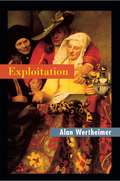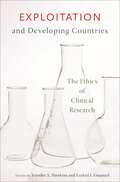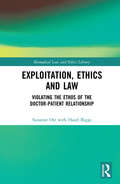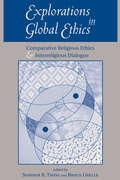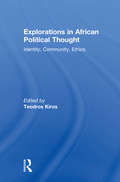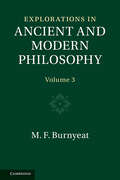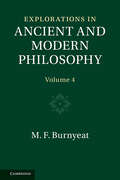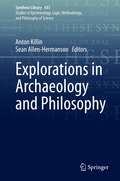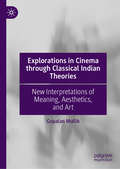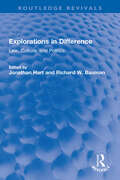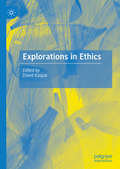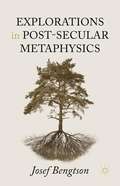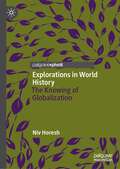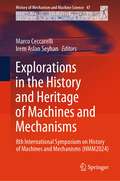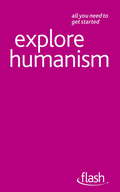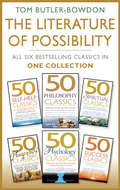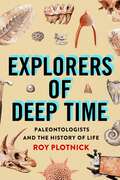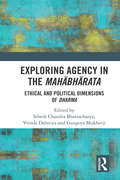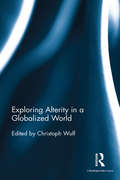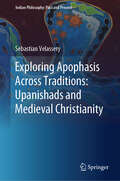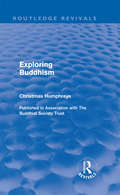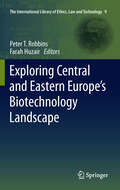- Table View
- List View
Explanatory Pluralism
by C. MantzavinosExplaining phenomena is one of the main activities in which scientists engage. This book proposes a new philosophical theory of scientific explanation by developing and defending the position of explanatory pluralism with the help of the notion of 'explanatory games'. Mantzavinos provides a descriptive account of the explanatory activity of scientists in different domains and shows how they differ from commonsensical explanations offered in everyday life by ordinary people and also from explanations offered in religious contexts. He also shows how an evaluation and a critical appraisal of explanations put forward in different social arenas can take place on the basis of different values. Explanatory Pluralism provides solutions to all important descriptive and normative problems of the philosophical theory of explanation as illustrated in sophisticated case studies from economics and medicine, but also from mythology and religion.
Exploitation
by Alan WertheimerWhat is the basis for arguing that a volunteer army exploits citizens who lack civilian career opportunities? How do we determine that a doctor who has sex with his patients is exploiting them? In this book, Alan Wertheimer seeks to identify when a transaction or relationship can be properly regarded as exploitative--and not oppressive, manipulative, or morally deficient in some other way--and explores the moral weight of taking unfair advantage. Among the first political philosophers to examine this important topic from a non-Marxist perspective, Wertheimer writes about ordinary experience in an accessible yet philosophically penetrating way. He considers whether it is seriously wrong for a party to exploit another if the transaction is consensual and mutually advantageous, whether society can justifiably prohibit people from entering into such a transaction, and whether it is wrong to allow oneself to be exploited. Wertheimer first considers several contexts commonly characterized as exploitive, including surrogate motherhood, unconscionable contracts, the exploitation of student athletes, and sexual exploitation in psychotherapy. In a section outlining his theory of exploitation, he sets forth the criteria for a fair transaction and the point at which we can properly say that a party has consented. Whereas many discussions of exploitation have dealt primarily with cases in which one party harms or coerces another, Wertheimer's book focuses on what makes a mutually advantageous and consensual transaction exploitive and analyzes the moral and legal implications of such exploitation.
Exploitation and Developing Countries: The Ethics of Clinical Research
by Jennifer S. Hawkins and Ezekiel J. EmanuelWhen is clinical research in developing countries exploitation? Exploitation is a concept in ordinary moral thought that has not often been analyzed outside the Marxist tradition. Yet it is commonly used to describe interactions that seem morally suspect in some way. A case in point is clinical research sponsored by developed countries and carried out in developing countries, with participants who are poor and sick, and lack education. Such individuals seem vulnerable to abuse. But does this, by itself, make such research exploitative? Exploitation and Developing Countries is an attempt by philosophers and bioethicists to reflect on the meaning of exploitation, to ask whether and when clinical research in developing countries counts as exploitative, and to consider what can be done to minimize the possibility of exploitation in such circumstances. These reflections should interest clinical researchers, since locating the line between appropriate and inappropriate use of subjects--the line between exploitation and fair use--is the central question at the heart of research ethics. Reflection on this rich and important moral concept should also interest normative moral philosophers of a non-Marxist bent. In addition to the editors, the contributors are Richard J. Arneson, Alisa L. Carse, Margaret Olivia Little, Thomas Pogge, Andrew W. Siegel, and Alan Wertheimer.
Exploitation, Ethics and Law: Violating the Ethos of the Doctor-Patient Relationship (Biomedical Law and Ethics Library)
by Suzanne Ost Hazel BiggsFocusing on a matter of continuing contemporary significance, this book is the first work to offer an in-depth exploration of exploitation in the doctor-patient relationship. It provides a theoretical analysis of the concept of exploitation, setting out exploitation’s essential elements within the authors’ account of wrongful exploitation. It then presents a contextual analysis of exploitation in the doctor-patient relationship, considering the dynamics of this fiduciary relationship, the significance of vulnerability, and the reasons why exploitation in this relationship is particularly wrongful. Two case studies – sexual exploitation and assisted dying – are employed to assess what the appropriate legal, ethical and regulatory responses to exploitation should be, to identify common themes regarding the doctor’s behaviour (such as the use of undue influence as a conduit through which to take advantage of and misuse patients), and to illustrate the effects of exploitation on patients. A recurring question addressed is how exploitation in the doctor-patient relationship is and should be dealt with by ethics, regulators and the law, and whether exploitation in this relationship is a special case. The book provides a critical, interdisciplinary evaluation of exploitation in the doctor-patient relationship that will be of interest to health care lawyers, bioethicists, legal academics and practitioners, health care professionals and policymakers.
Explorations In Global Ethics: Comparative Religious Ethics And Interreligious Dialogue
by Sumner B TwissInspired by the 1993 Parliament of the Worlds Religions, this volume for the first time brings the scholarly discipline of comparative religious ethics into constructive collaboration with the community of interreligious dialogue. The contributors draw from both communities of discourse in addressing questions of method and theory and global moral issuessuch as human rights, distributive justice, politics of war, international business, the environment, and genocidein a cross-cultural context. }Inspired by the 1993 Parliament of the Worlds Religions, this volume for the first time brings the scholarly discipline of comparative religious ethics into constructive collaboration with the community of interreligious dialogue. Its design is premised on two important insights. First, interreligious dialogue offers to comparative religious ethics a new, more persuasive rationale, agenda of issues, and practical orientation. Second, comparative religious ethics offers to interreligious dialogue an arsenal of critical tools and methods which will enhance the sophistication of its practical work. In this way, both theory (a dominant concern and strength of comparative religious ethics) and praxis (a dominant concern and strength of interreligious moral dialogue) are joined together in mutual effort, each contributing to the benefit of the other.The volumes contributors share this vision of collaboration, drawing explicitly from both communities of discourse in a manner that crosses disciplinary and professional boundaries to deal creatively and constructively with important methodological and global moral issue. Although theory and practice cannot easily be separated in such a collaborative project, for the purpose of clarity, the volume is divided into two main parts. The first specifically engages questions of method, theory, and the social role of the public intellectual; the second, on substantive moral themes and issues, many of which were raised at the 1993 Parliament. Taken together, the volumes essays articulate and illustrate new ways of approaching contemporary moral concerns cross-culturally yet with a rigor appropriate to our complex and pluralistic world.
Explorations in African Political Thought: Identity, Community, Ethics
by K. Anthony Appiah Teodros KirosThis rich collection brings together many of the leading authorities on African political philosophy to present a variety of perspectives on this rapidly growing field. They seek to show that African philosophy can serve African people as a moral activity guided by the principles of practical reason in addressing problems of the basic structures of social, political, and economic institutions.
Explorations in Ancient and Modern Philosophy
by M. F. BurnyeatM. F. Burnyeat taught for 14 years in the Philosophy Department of University College London, then for 18 years in the Classics Faculty at Cambridge, 12 of them as the Laurence Professor of Ancient Philosophy, before migrating to Oxford in 1996 to become a Senior Research Fellow in Philosophy at All Souls College. The studies, articles and reviews collected in these two volumes of Explorations in Ancient and Modern Philosophy were all written, and all but two published, before that decisive change. Whether designed for a scholarly audience or for a wider public, they range from the Presocratics to Augustine, from Descartes and Bishop Berkeley to Wittgenstein and G. E. Moore. Their subject-matter falls under four main headings: 'Logic and Dialectic' and 'Scepticism Ancient and Modern', which make up the first volume, with 'Knowledge' and 'Philosophy and the Good Life' contained in this, the second volume. The title 'Explorations' well expresses Burnyeat's ability to discover new aspects of familiar texts, new ways of solving old problems. In his hands the history of philosophy becomes itself a philosophical activity.
Explorations in Ancient and Modern Philosophy: Volume 3
by Myles BurnyeatMyles Burnyeat (1939–2019) was a major figure in the study of ancient Greek philosophy during the last decades of the twentieth century and the first of this. After teaching positions in London and Cambridge, where he became Laurence Professor, in 1996 he took up a Senior Research Fellowship at All Souls College, Oxford, from which he retired in 2006. In 2012 he published two volumes collecting essays dating from before the move to Oxford. Two new posthumously published volumes bring together essays from his years at All Souls and his retirement. The main body of Volume 3 presents studies written for a wide readership, first on Plato's Republic and then on the reading and interpretation of Plato in subsequent periods, particularly in nineteenth-century Britain. The volume also includes hitherto unpublished lectures, 'The Archaeology of Feeling', on the ancient origins of some key modern philosophical and psychological concepts.
Explorations in Ancient and Modern Philosophy: Volume 4
by Myles BurnyeatMyles Burnyeat (1939-2019) was a major figure in the study of ancient Greek philosophy during the last decades of the twentieth century and the first of this. After teaching positions in London and Cambridge, where he became Laurence Professor, in 1996 he took up a Senior Research Fellowship at All Souls College, Oxford, from which he retired in 2006. In 2012 he published two volumes collecting essays dating from before the move to Oxford. Two new posthumously published volumes bring together essays from his years at All Souls and his retirement. The essays in Volume 4 are addressed principally to scholars engaging first with fundamental issues in Platonic and Aristotelian metaphysics and epistemology and in Aristotle's philosophical psychology. Then follow studies tackling problems in interpreting the approaches to physics and cosmology taken by Plato and Aristotle, and in assessing the evidence for early Greek exercises in optics.
Explorations in Archaeology and Philosophy (Synthese Library #433)
by Anton Killin Sean Allen-HermansonThis volume explores various themes at the intersection of archaeology and philosophy: inference and theory; interdisciplinary connections; cognition, language and normativity; and ethical issues. Showcasing this heterogeneity, its scope ranges from the method of analogical inference to the evolution of the human mind; from conceptual issues in assessing the health of past populations to the ethics of cultural heritage tourism. It probes the archaeological record for evidence of numeracy, curiosity and creativity, and social complexity. Its contributors comprise an interdisciplinary cluster of philosophers, archaeologists, anthropologists, and psychologists, from a variety of career stages, of whom many are leading experts in their fields. Chapter 3 is available open access under a Creative Commons Attribution 4.0 International License via link.springer.com.
Explorations in Cinema through Classical Indian Theories: New Interpretations of Meaning, Aesthetics, and Art
by Gopalan MullikThis book explores cinema and film theory through classical Indian theories. While non-Western philosophies have largely been ignored by existing paradigms, Gopalan Mullik responds through an interrogation of how audio-visual images are processed by the audiences at the basic level of their being outside of Western experience. In the process, this book moves away from the heavily Eurocentric film discourse of today while also detailing how this new platform for understanding cinema at the most basic level of its meaning can build upon existing film theories rather than act as a replacement for them.
Explorations in Difference: Law, Culture, and Politics (Routledge Revivals)
by Jonathan Hart Richard W. BaumanFirst published in 1996, Explorations in Difference explores how contemporary debates over identity and difference come into play within the workings of cultural, legal, and political institutions. The book brings together a variety of perspectives on the meanings and implications of difference in the context of postmodern theory. It is divided into two parts: ‘Theoretical Accounts’, which establishes a context for postmodern inquiries into difference, and ‘Instances’, which provides application to particular issues. Highly interdisciplinary, Explorations in Difference continues to have lasting relevance and will appeal to those with an interest in postmodern difference and its implications.
Explorations in Ethics: Meta, Normative, And Applied
by David KasparExplorations in Ethics is a collection of essays with a speculative bent. Its twelve contributors attempt to take ethics thinking in new directions. Ethics is fundamentally a speculative discipline. We sometimes lose sight of that because of our current scholarly practices, which include reliance on a set of traditional works in ethics, deferring to the scholarly literature, drawing from the evidential sources afforded us. This volume breaks the mold. It is committed, first and foremost, to exploring new ground in a methodologically sound way whilst respecting and building on the literature where needed. The contributors range from world renowned ethicists to early-career scholars. The ethical standpoints represented are various and the overall aim of this collection is to stimulate fresh thinking.
Explorations in World History: The Knowing of Globalization
by Niv HoreshThis book provides an analysis of the latest research findings in the field of world history, and includes terse articulations of modernity vis-à-vis empire. In doing so, the author brings together insights from both the disciplines of history and international relations into world systems, emphasising economic aspects, and offering a road map for the evolution of the field of world history.The book achieves this by critically analysing the works of Peter Fibiger Bang, Christopher Alan Bayly, Walter Scheidel, Krishnan Kumar, Xin Fan, Christopher A. Ford and Diego Olstein. The author includes discussions such as how the Roman empire impacted all subsequent Western empires, both early and modern, and current debates in world history and politics such as China’s rise.
Explorations in the History and Heritage of Machines and Mechanisms: 8th International Symposium on History of Machines and Mechanisms (HMM2024) (History of Mechanism and Machine Science #47)
by Marco Ceccarelli Irem Aslan SeyhanThis book gathers the latest advances in the field of history of science and technology, as presented by leading international researchers at the 8th International Symposium on History of Machines and Mechanisms (HMM), held in Ankara, Turkey on April 18-20, 2024. The Symposium, which was promoted by the permanent commission for the History of Machine and Mechanism Science (MMS) of IFToMM, provided an international forum to present and discuss historical developments in the field of MMS. The contents cover all aspects of the development of MMS from antiquity until the present era and its historiography: modern reviews of past works, engineers in history and their works, the development of theories, history of the design of machines and mechanisms, historical developments of mechanical design and automation, historical developments of teaching, the history of schools of engineering, the education of engineers. The contributions, which were selected by means of a rigorous international peer-review process, highlight numerous exciting ideas that will spur novel research directions and foster multidisciplinary collaborations.
Explore Humanism: Flash
by Mark VernonThis new title in the popular 'Flash' series gets straight to the key facts about Humanism. In just 96 pacy, jargon-free pages, you will:- see why humanism matters- study its ancient roots- understand explore the enlightenment- discover contemporary humanism- learn where science fits inand much more besides!
Explore Humanism: Flash
by Mark VernonThis new title in the popular 'Flash' series gets straight to the key facts about Humanism. In just 96 pacy, jargon-free pages, you will:- see why humanism matters- study its ancient roots- understand explore the enlightenment- discover contemporary humanism- learn where science fits inand much more besides!
Explore the Literature of Possibility (Trailer)
by Tom Butler-BowdenWhat is the literature of possibility? For over 2,000 years, philosophers have been interested in what makes for "the good life" in terms of the ability to provide for oneself and one's family, enjoy the pleasures of culture and nature, participate in political life, and make some contribution to society. The literature of possibility is certainly about achieving the good life, but it goes a step beyond this to ask about the full range of possibilities carried within a person. Many people achieve a good "lifestyle" but still wonder: Is there something more I could do?
Explorers of Deep Time: Paleontologists and the History of Life
by Roy PlotnickPaleontology is one of the most visible yet most misunderstood fields of science. Children dream of becoming paleontologists when they grow up. Museum visitors flock to exhibits on dinosaurs and other prehistoric animals. The media reports on fossil discoveries and new clues to mass extinctions. Nonetheless, misconceptions abound: paleontologists are assumed only to be interested in dinosaurs, and they are all too often imagined as bearded white men in battered cowboy hats.Roy Plotnick provides a behind-the-scenes look at paleontology as it exists today in all its complexity. He explores the field’s aims, methods, and possibilities, with an emphasis on the compelling personal stories of the scientists who have made it a career. Paleontologists study the entire history of life on Earth; they do not only use hammers and chisels to unearth fossils but are just as likely to work with cutting-edge computing technology. Plotnick presents the big questions about life’s history that drive paleontological research and shows why knowledge of Earth’s past is essential to understanding present-day environmental crises. He introduces readers to the diverse group of people of all genders, races, and international backgrounds who make up the twenty-first-century paleontology community, foregrounding their perspectives and firsthand narratives. He also frankly discusses the many challenges that face the profession, with key takeaways for aspiring scientists. Candid and comprehensive, Explorers of Deep Time is essential reading for anyone curious about the everyday work of real-life paleontologists.
Exploring Agency in the Mahabharata: Ethical and Political Dimensions of Dharma
by Sibesh Chandra Bhattacharya Vrinda Dalmiya Gangeya MukherjiThe Mahabharata, one of the major epics of India, is a sourcebook complete by itself as well as an open text constantly under construction. This volume looks at transactions between its modern discourses and ancient vocabulary. Located amid conversations between these two conceptual worlds, the volume grapples with the epic’s problematisation of dharma or righteousness, and consequently, of the ideal person and the good life through a cluster of issues surrounding the concept of agency and action. Drawing on several interdisciplinary approaches, the essays reflect on a range of issues in the Mahabharata, including those of duty, motivation, freedom, selfhood, choice, autonomy, and justice, both in the context of philosophical debates and their ethical and political ramifications for contemporary times. This book will be of interest to scholars and researchers engaged with philosophy, literature, religion, history, politics, culture, gender, South Asian studies, and Indology. It will also appeal to the general reader interested in South Asian epics and the Mahabharata.
Exploring Alterity in a Globalized World
by Christoph WulfThis volume develops a unique framework to understand India through indigenous and European perspectives, and examines how it copes with the larger challenges of a globalized world. Through a discussion of religious and philosophical traditions, cultural developments as well as contemporary theatre, films and media, it explores the manner in which India negotiates the trials of globalization. It also focuses upon India’s school and education system, its limitations and successes, and how it prepares to achieve social inclusion. The work further shows how contemporary societies in both India and Europe deal with cultural diversity and engage with the tensions between tendencies towards homogenization and diversity. This eclectic collection on what it is to be a part of global network will be of interest to scholars and researchers of South Asian studies, philosophy, sociology, culture studies, and religion.
Exploring Apophasis Across Traditions: Upanishads and Medieval Christianity (Indian Philosophy: Past and Present)
by Sebastian VelasseryThis book delves into the ethics of apophasis across ancient Indian philosophy, pre-Socratic Greek thinkers, and early medieval Christianity. The chapters explore apophasis in the Upanishads, the Rig Veda, and Sankara’s Advaita Vedanta. The author also offers insights into the evolution of apophasis in the Western tradition, moving from Heraclitus and early Christianity to medieval Christianity. An insightful exploration provides a rich dialogue between traditions and makes it an interesting read for scholars and students worldwide in theology and philosophy.
Exploring Buddhism (Routledge Revivals)
by Christmas HumphreysThe Buddhist field of knowledge is now so vast that few can master all of it, and the study and application of its principles must be a matter of choice. One may choose the magnificent moral philosophy of Theravada, the oldest school, or the Zen training of Japan; or special themes such as the doctrine of No-self, the Mahayana emphasis on compassion or the universal law of Karma and Rebirth. But the intense self-discipline needed for true spiritual experience calls for specialization of subject and technique. In this reissue, first published in 1974, Christmas Humphreys takes us on a personal journey through Buddhism, offering insights into the many different paths, doctrines and approaches to Buddhism. This collection of twenty essays ranges from history to doctrine, and from the rise of Buddhism in the West through to the finer points of its everyday practice. It is a truly valuable piece of Western Buddhist literature and its reissue will be welcomed be scholars of Buddhism and interested laypeople alike.
Exploring Central and Eastern Europe’s Biotechnology Landscape
by Peter T. Robbins Farah HuzairAt a time when the human genome has been sequenced advances in the life sciences seem to have great potential for human health, industry and the environment throughout Central and Eastern Europe (CEE). Still, for some, potential risks and ethical dilemmas remain, surrounding issues such as the appropriate use of GM crops, stem cells, genetic information, the nature of intellectual property and other challenges that come with EU accession. This book is the first of its kind to bring together experts from across Europe to explore the landscape of current life science policy and industrial development in CEE, including implications for economies, regulatory and legal frameworks, health care, ethics and human rights. It will be essential reading for researchers and students in science and technology studies, development, sociology, politics and law, and those interested in life science development in transition economies.

